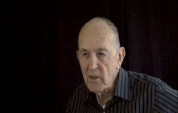6:09 | The procedure when you ditch in the ocean is for all the crew except the pilots to sit in a line from tallest to shortest to prepare for impact. As the tallest man in the plane, Bill Couch got the worst of it when the plane hit the water. After a night floating in two life rafts, the crew wondered, who would be the first to respond to their SOS? Part 3 of 3.
Keywords : William Bill Couch Boeing B-17 Flying Fortress bombardier ditch Mediterranean life raft SOS Coffee Grinder radio Sicily Italy Germans Messerschmitt Bf 109 (ME-109) flying boat

Veronica Lake's films about aviators had a lot to do with it, that and the draft. Bill Couch thought his survival chances would be better in the air so he went for the Air Corps but, once he was in training, he realized there were a lot of ways to die up there.
The first mission was a milk run, no flak and no enemy fighters. B-17 bombardier Bill Couch was glad for that, but the mission failed to achieve the objective. The German sub pens on the French coast had something that protected them from aerial bombing.
Wake up time was 3:30 AM. This tended to make bombardier Bill Couch rather grouchy. No time for that. There was a briefing, there was breakfast and the gear had to be loaded onto the plane, including the bombsight.
The weather had to be clear for the mass bombing technique used by the Allies. B-17 bombardier Bill Couch recalls several missions that had to be scrubbed because the target wasn't visible. If you were lucky, you had an alternate target you could hit. If German fighters came at you, you had to man a .50 cal machine gun.
The mission to Bremerhaven was rough. From his seat up in the nose, bombardier Bill Couch saw other B-17's going down with parachutes streaming out, some on fire. When German fighters were attacking, the leading edge of their wings seemed to have sparklers and he came to dread that sight.
On a bombing mission, you could experience terror and ecstasy in the same day. The ecstasy was if you made it back. B-17 bombardier Bill Couch relates the story of his seventh and final mission, one which was shaky from the beginning. Part 1 of 3.
They couldn't keep up with the formation. With flak damage affecting the engines, the pilot had to drop out. B-17 bombardier Bill Couch managed to hit a German fighter with the .50 cal machine gun he had up in the nose but that didn't do anything to keep the big plane aloft. They lost one engine, then another. Could they keep two going? Part 2 of 3.
For you, the war is over. That's what Bill Couch heard from the first German to speak when he and the rest of the B-17 crew were taken into custody. First they were held at a naval base where the piano playing radio operator entertained their captors. Then they were taken to Naples where an Italian mob posed an unexpected menace.
Bill Couch was heading into Germany but this time it wasn't on a bombing run. The newly captured B-17 bombardier was going to Dulag Luft, a collection and interrogation camp for POW's. His interrogator knew as much as he did about his unit and their operations. Well, not much point in questioning me, is there?
It was a drab place but at least Bill Couch was among his own. Stalag Luft III was in occupied Poland and life at the huge camp proved to be bearable. There was athletic equipment, a library, and an orchestra. He even developed a taste for the infamous German black bread.
There were many escape attempts at Stalag Luft III. In fact, one ill fated mass escape was immortalized in the movie, The Great Escape. Bill Couch recalls his experiences as a prisoner at that camp and relates what happened in the aftermath of that incident.
It was Christmas in 1944 and the prisoners at Stalag Luft III wondered if they would see the next Christmas at home. A lot of uncertainty was added when the Germans forced them out on the road in a march southward into Germany. Bill Couch describes that trip and their short stay at the next Stalag.
The target was a Messerschmitt factory in Regensburg. That made it a labor of love for the B-17 crews. Bill Couch recalls that, once their fighter escort had to turn back, it was a running gun battle all the way to the target. There was heavy flak, too, and their engines took some damage. They lost one, then another. How long could they stay up? Part 1 of 3.
After they had to ditch their B-17 in the ocean between Naples and Sicily, it was the Germans who got to them first. Bill Couch and the rest of the crew were now POW's. They were sent to Stalag Luft III, a huge camp in occupied Poland. It was no country club but at least they weren't abused by the guards. The SS and the Gestapo, though, you wanted to steer clear when they were around. Part 2 of 3.
As the advancing Russians were getting closer, the POW's at Stalag Luft III were forced to travel from occupied Poland into Germany. Before that, there had been an ill fated mass escape that was immortalized in the movie, The Great Escape. Bill Couch was one of those POW's and he gives his perspective on all that as the war was winding down. Part 3 of 3.